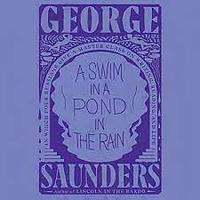You need to sign in or sign up before continuing.
Take a photo of a barcode or cover
1.51k reviews for:
A Swim in a Pond in the Rain: In Which Four Russians Give a Master Class on Writing, Reading, and Life
George Saunders
1.51k reviews for:
A Swim in a Pond in the Rain: In Which Four Russians Give a Master Class on Writing, Reading, and Life
George Saunders
informative
informative
medium-paced
Lovely, definitely going to influence my reading and my writing
challenging
informative
inspiring
fast-paced
“According to Pevear, Tolstoy wrote the story in one day. When he was done, he didn't like it. "Wrote Alyosha, very bad," he recorded in his diary. "Gave it up."
***
“Language is a meaning approximator that sometimes gets too big for its britches and deceives us, intentionally (someone with an agenda twists language to urge us into action) or unintentionally (with an idea in mind, we build an earnest case, seeking the language to make our idea seem true, unaware that, too fond of our idea, we're stretching the thin fabric of language over untrue places in our argument).
Language, like algebra, operates usefully only within certain limits.
It's a tool for making representations of the world, which, unfortunately, we then go on to mistake for the world itself. Gogol is not making a ridiculous world; he's showing us that we ourselves make a ridiculous world in every instant, by our thinking.
Like someone who watches a friend freak out during an emergency, we may, after reading Gogol, never look at our old pal language the same way again.
Which is a good thing. We wouldn't want to mistake a truth-approximating tool for the truth itself.”
***
“There's a certain way of talking about stories that treats them as a kind of salvation, the answer to every problem; they are "what we live by” and so on. And, to an extent, as you can see by this book, I agree.
But I also believe, especially as I get older, that we should keep our expectations humble. We shouldn't overestimate or unduly glorify what fiction does. And actually, we should be wary of insisting that it do anything in particular. The critic Dave Hickey has written about this, the notion that saying what art should do might enable a reactionary establishment to start saying what it must do, and then to begin silencing those artists whose works aren't doing that. In other words, whenever we get up on the soapbox and sing fiction's praises, explaining how good it is for everyone, we're actually limiting its freedom to be... whatever it wants to be (perverse, contrary, frivolous, objectionable, useless, too difficult for any but a few to read, and so on).”
***
“Language is a meaning approximator that sometimes gets too big for its britches and deceives us, intentionally (someone with an agenda twists language to urge us into action) or unintentionally (with an idea in mind, we build an earnest case, seeking the language to make our idea seem true, unaware that, too fond of our idea, we're stretching the thin fabric of language over untrue places in our argument).
Language, like algebra, operates usefully only within certain limits.
It's a tool for making representations of the world, which, unfortunately, we then go on to mistake for the world itself. Gogol is not making a ridiculous world; he's showing us that we ourselves make a ridiculous world in every instant, by our thinking.
Like someone who watches a friend freak out during an emergency, we may, after reading Gogol, never look at our old pal language the same way again.
Which is a good thing. We wouldn't want to mistake a truth-approximating tool for the truth itself.”
***
“There's a certain way of talking about stories that treats them as a kind of salvation, the answer to every problem; they are "what we live by” and so on. And, to an extent, as you can see by this book, I agree.
But I also believe, especially as I get older, that we should keep our expectations humble. We shouldn't overestimate or unduly glorify what fiction does. And actually, we should be wary of insisting that it do anything in particular. The critic Dave Hickey has written about this, the notion that saying what art should do might enable a reactionary establishment to start saying what it must do, and then to begin silencing those artists whose works aren't doing that. In other words, whenever we get up on the soapbox and sing fiction's praises, explaining how good it is for everyone, we're actually limiting its freedom to be... whatever it wants to be (perverse, contrary, frivolous, objectionable, useless, too difficult for any but a few to read, and so on).”
challenging
informative
reflective
relaxing
challenging
informative
inspiring
slow-paced
-My slowest (but most rewarding) read this year as I have to focus and absorb every lesson and afterthought, spacing out the stories and trying my best not to get drained by them. It’s also my first time to read from our Russian grandpas in a while so the brain cells were hard at work but I knew early on that this was for something very beneficial for constant readers like me.
This is not a work to be read in one go, it is to be taken in, piece by piece, day by day. Reading it continuously will probably fry my feeble brain so I had to take breaks, one story daily for 7 days. The audiobook narrated by Saunders himself helped me progress further as well.
It felt like being in English Lit class all over again but this time with the privilege of Saunders being my professor. He takes every story to different directions and dissects them in ways I can never think of. He really takes his time in explaining technical concepts like Chekhov’s gun, Freytag’s triangle, Rubin’s vase; even using effective examples and metaphors to get there.
Also learned about reader’s tools like the TICHN cart (Things I Can’t Help Noticing), the word skaz and how writing is mostly two things- (1) becoming convinced that there is a voice inside you that really, really knows what it likes, and (2) getting better at hearing that voice and acting on its behalf.
I also had a very fun and interesting discussion
with my book club friends about this book, thankyou Rhena for moderating and Angus and Aaron for letting me listen in to your podcast😅 How lucky am I to have someone to talk about these stories with.
Through this book, Saunders helped me become more consciously aware of what I’m reading and to analyze it not to be overly critical but to properly digest the details of a story for a richer reading experience. It reminds us of the power of fiction on how it can both expand and make our world smaller, how it connects us because what is in me is in you as well. It also reminded me of my long forgotten dream of being able to write my own story someday.
I ended my mentorship with Saunders picking up a few things along the way and know that those incremental changes in my state of mind were not nothing. I am grateful and honored for reading this book. What a journey it was.
I’ll be continuing my Saunders readathon with Lincoln in the Bardo next!
funny
hopeful
informative
inspiring
medium-paced
Five stars for the wonderful classic Russian stories. The commentaries by Saunders are also very good.
These Russian guys were on one!!!! I have always wanted to go through some Russian classics but it always felt so daunting (where do I start, how do I stay interested), but George Saunders really makes this short stories exciting and engaging, adding context and guiding the reading. Almost enrolled in graduate school again after reading this book but times are tough, and grad school is thousands of dollars and this book was $20… Yeah, I’ll take the book, please!






